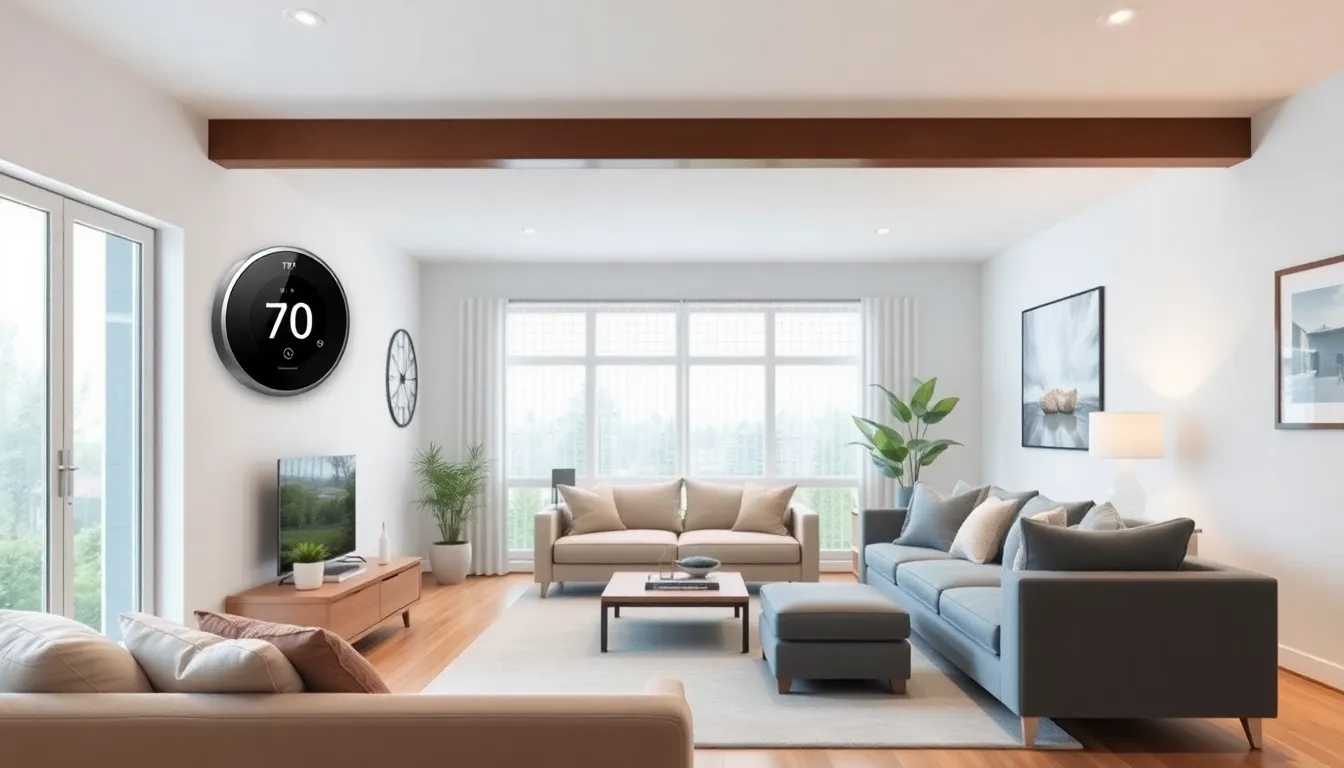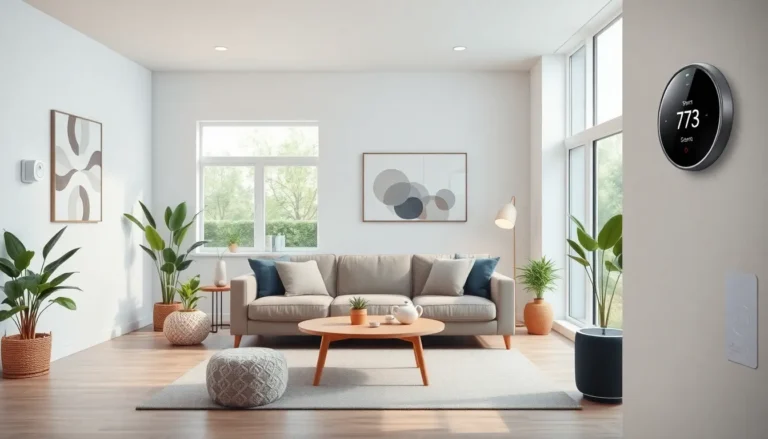Table of Contents
ToggleIn a world where smart homes are all the rage, having high “home IQ” isn’t just a bragging right—it’s a necessity. Imagine your house not only understanding your needs but also anticipating them like a well-trained butler. Whether it’s adjusting the thermostat before you even think about it or reminding you to water the plants (because let’s face it, they can’t water themselves), a high home IQ can transform everyday living into a seamless experience.
But what exactly is home IQ? It’s the clever blend of technology and design that makes a house feel like a home. As homes get smarter, so do the ways to measure their intelligence. In this article, we’ll explore the ins and outs of home IQ, why it matters, and how you can elevate your living space from “meh” to “wow.” Get ready to unlock the potential of your home and impress your friends—who knew your house could be the smartest one on the block?
What Is Home IQ?
Home IQ represents the digital intelligence embedded within a living space, facilitating an environment that learns from and adapts to its occupants’ routines. It integrates various technologies, such as sensors, smart devices, and automation systems, creating a cohesive network that elevates daily living experiences.
Automation plays a key role in home IQ. Smart thermostats adjust temperatures based on occupancy patterns, enhancing comfort while improving energy efficiency. Lighting systems can respond to natural light levels, automatically adjusting to maintain optimal brightness.
Home security features contribute significantly to a home’s IQ. Enhanced security cameras monitor surroundings, providing real-time alerts to potential threats. Smart locks enable secure access management, allowing homeowners to grant entry remotely.
Additionally, home IQ encourages seamless connectivity. Voice-activated assistants control various devices, providing convenience through simple voice commands. Smart appliances can communicate with each other, streamlining household tasks and ensuring they align with user preferences.
Understanding home IQ fosters the ability to create a personalized living environment tailored to individual needs. This intelligence makes homes not just livable spaces but interactive ecosystems that enhance quality of life. Embracing this concept empowers homeowners to maximize the potential of their living spaces while promoting sustainability and efficiency.
Benefits of Home IQ

Home IQ contributes significantly to enhancing everyday living. This integration of technology within a home leads to various advantages tailored to occupants’ needs.
Improved Decision Making
Data-driven insights drive better decision making. By analyzing patterns in energy usage, smart systems recommend optimal settings for heating and cooling, cutting costs without sacrificing comfort. Homeowners receive notifications when maintenance issues arise, enabling timely repairs. Smart appliances even suggest meal plans based on inventory, reducing food waste. Enhanced decision making not only saves money, it improves the home’s overall efficiency and sustainability.
Enhanced Home Management
Convenience defines enhanced home management. Automation streamlines daily tasks, making them simpler and more efficient. Smart security systems grant access through mobile devices, allowing homeowners to monitor their properties remotely. Voice assistants manage schedules and reminders, reducing the chances of forgetting crucial events. Coordinated systems optimize energy consumption, ensuring lights and thermostats adjust automatically when occupants leave. With these tools, homeowners enjoy a higher quality of life while maximizing their home’s potential.
How to Increase Your Home IQ
Increasing home IQ involves integrating advanced technologies and accessing relevant resources. Engaging with smart technology and educating oneself on home management strategies can significantly enhance overall performance.
Smart Technology Integration
Incorporating smart devices elevates the intelligence of a home. Smart thermostats adjust temperatures based on occupancy, optimizing energy use while maintaining comfort. Automated lighting systems respond to ambient light, enhancing efficiency and reducing energy consumption. Home security systems contribute by offering real-time alerts and smart locks that manage access with ease. Voice-activated assistants enable communication between devices, streamlining daily tasks. By seamlessly connecting these technologies, homeowners create an environment that learns and adapts to their routines.
Education and Resources
Utilizing educational materials enhances understanding of home technology. Online courses and webinars provide insight into effective smart home strategies. Home improvement forums and blogs share practical tips for optimizing technology use. Books focused on smart home innovations offer in-depth knowledge of available options. Local workshops often introduce homeowners to the latest developments in home automation. Accessing these resources equips individuals to maximize their home IQ, enriching daily living experiences.
Common Misconceptions About Home IQ
Many people believe home IQ only involves basic automation features, yet it encompasses a broader range of technologies that work together. Some consider smart devices a luxury rather than an essential component of modern living; however, these systems significantly enhance daily efficiency and sustainability. Homeowners often think that upgrading to smart technology guarantees substantial energy savings, but savings depend on proper integration and usage.
Another misconception involves the idea that all smart devices communicate seamlessly with one another. In reality, compatibility issues can arise between different brands and systems, impacting the effectiveness of a home’s overall IQ. Additionally, some individuals assume that the maintenance of smart technology is burdensome; in fact, many devices feature self-diagnosing capabilities that simplify upkeep.
People frequently underestimate the role of data analysis in home IQ. Smart systems assess occupancy patterns and energy usage to inform real-time adjustments, improving comfort and sustainability. Misbeliefs also exist around the security of smart homes; robust encryption and advanced security features protect against unauthorized access.
Another common misunderstanding is that a fully smart home requires extensive renovation, making it less accessible for some homeowners. Modular installations and gradual upgrades offer feasible options to enhance home IQ without a complete overhaul. Many still believe that home IQ is unaffordable, yet the long-term savings on energy bills and maintenance often offset initial investments.
Overall, clarifying these misconceptions helps individuals make informed decisions about implementing technologies that truly enhance their living environments.
Embracing the concept of home IQ can significantly transform a living space into a responsive and efficient environment. By integrating advanced technologies and understanding their functionalities, homeowners can create a personalized experience that meets their unique needs.
The journey to enhancing home IQ doesn’t have to be overwhelming. With the right resources and gradual upgrades, anyone can elevate their home’s intelligence while enjoying the benefits of automation and improved management.
As homes become smarter, the potential for increased efficiency and sustainability grows. Investing in home IQ not only enhances daily living but also paves the way for a more connected and eco-friendly future.







